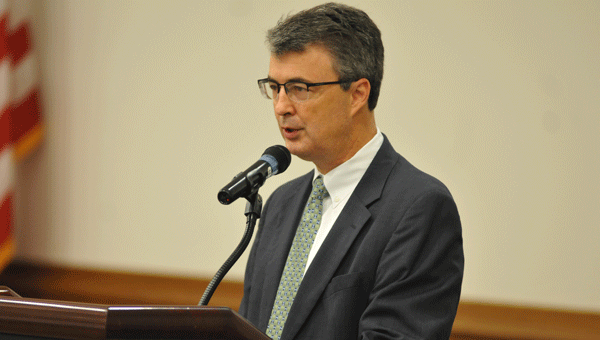Attorney general speaks on state’s opioid problem
Published 10:55 pm Friday, November 3, 2017

- Alabama attorney general Steve Marshall spoke at the Purple for a Purpose conference for Alzheimer’s Disease Awareness and Caregivers Month, held Friday from LBW Community College’s Wendell Mitchell Center. Marshall highlighted the challenges facing the state in combating the growing opioid crisis.
L.V. Stabler’s senior care unit and the Greenville Area Chamber of Commerce presented Purple with a Purpose for Alzheimer’s Disease Awareness and Caregivers Month at LBW’s Wendell Mitchell Center Friday.
Among a slate of speakers was Alabama attorney general Steve Marshall, who spoke on the role that caregivers, law enforcement and other institutions can play in the opioid crisis sweeping the nation.
Eighty-five percent of the opioids manufactured on the planet are consumed in the United States, which accounts for less than 5 percent of the world’s population.
For Marshall, that points to at least a pair of significant factors.
“One, we probably have greater access to medical care here than many of those who surround us or across the world,” he said. “But I also think we’ve begun to demand pain management differently than our peers.
“I remember as a young boy getting my wisdom teeth taken out. I didn’t necessarily have a fun experience with that; it hurt, but I got Tylenol. By daughter had her wisdom teeth taken out at about the same age, and she went home with Percocet.”
Marshall went on to illustrate the scale of the opioid crisis with a startling statistic; 147 people die each day nationwide to opioid abuse. In Alabama, the number of deaths due to opioids has quadrupled since 1999.
“We’re losing more people nationally every three weeks than those who died in 9/11,” Marshall said.
Alabama in No. 1 in the country per capita in the number of prescriptions issued for opioids at 1.2 per person.
“I do think that sometimes crisis is a word that gets thrown out too often,” Marshall said.
“This is a crisis. And it’s a crisis different from other drugs we’ve seen that are subject to abuse because of the number of people we’re losing.”
Marshall added that law enforcement has a role to play in curbing the epidemic, citing a potential fentanyl trafficking bill as an example of steps the state legislature could take.
Whereas a trafficking charge for meth requires 28 grams, Marshall said that four grams, or four sugar packets’ worth, of fentanyl could kill a conference room full of people.
Marshall also discussed the importance of the Alabama Prescription Drug Monitoring Program (PDMP), which was developed to detect diversion, abuse and misuse of prescription medications.
“The idea is if I’m an addict showing up at my family doctor on Monday with knee pain, and that doctor gives me 30 days’ worth of Lortab, and then when I show up at another doctor Tuesday complaining of back pain and I say I need Percocet, that doctor would know that I was just at someone’s office the day before,” Marshall said.
He added that a monetary investment of $1.2 million would be required to make the program as effective as it could be, but Alabama’s resource struggles would make the funding of the PDMP a challenge.
“A robust, effective and thoroughly used PDMP does more to affect overdose death than anything we could do,” he added.
The final component to battling the opioid crisis, Marshall said, was increased community engagement and education of youth on the dangers of prescription drug abuse.
Without that, he said, all of the policy changes in the world would mean nothing.
“But I’m encouraged, because I really do think people are committed to this going forward, greater recognition of problem,” he said.
“There is no silver bullet. There is no singular answer. Alabama is going to be a little different from our neighboring states, but I also think there are some things that they are doing that we can do here in Alabama.”





